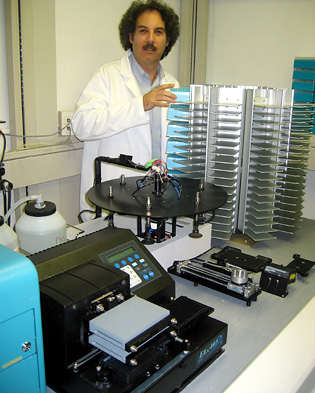UCSF Discovery Is Major Focus of $46 Million Grant to Combat Diarrhea
A $46 million grant from the Bill & Melinda Gates Foundation to develop new treatments for severe diarrhea will focus much of its initial support on potential, new drugs discovered at UCSF. Diarrhea is a leading killer of children under the age of 5 worldwide and kills about 5 million people a year.
The San Francisco-based Institute for OneWorld Health (iOWH), which received the Gates Foundation grant, aims to accelerate development of drug candidates recently discovered at UCSF by Alan Verkman, MD, PhD, professor of medicine and physiology. Preclinical studies in Verkman's laboratory over the last few years have identified potential drugs that are hundreds of times more effective than prior compounds at blocking the major route of fluid loss from some life-threatening forms of diarrhea.
Adults with diarrheal disease can lose fluid equal to their total body weight in a day. The fluid loss can kill an infant in an hour. The young, old and weak are particularly vulnerable.
Many diarrheal diseases are caused by toxins from bacteria attacking cells that line the intestine. Two of the major infectious bacteria involved are Escherichia coli and Vibrio cholerae, both ingested by eating contaminated food or water. The result can be rapid fluid loss and severe dehydration. The standard treatment is to provide high volumes of fluid, but this is often not successful in children in developing countries. No drug is currently available to stop the fluid loss.
Verkman's laboratory sought potential drugs that could control the final step in fluid movement into or out of the intestine - secretion through channels in the membrane that makes up the inside lining of the intestine. The channel for fluid secretion by the intestine is known as the cystic fibrosis transmembrane conductance regulator, or CFTR.
The scientists screened for compounds that inhibited CFTR function and thereby blocked fluid loss out of the intestine. They sought compounds that either directly blocked the channel opening or chemically bound to the CFTR protein, preventing it from functioning as an ion channel.
In a high-throughput screening of about 200,000 compounds, they discovered several classes of potent CFTR inhibitors and confirmed their effectiveness in animal studies. The Institute for OneWorld Health now intends to help optimize compounds discovered by the Verkman lab as potential drug candidates to treat severe diarrheal disease.
"Dr. Verkman's research into CFTR at UCSF is one of several promising approaches that will contribute to our goal of developing safe, effective and affordable drugs for the treatment of diarrheal diseases in developing countries," said Susan Wilson, PhD, program director of diarrheal disease at iOWH.
"These compounds are very potent in preventing intestinal fluid secretion in animals," Verkman said. "The support from OneWorld Health can accelerate the development of life-saving drugs for severe diarrhea in developing countries."
One class of compounds that Verkman's lab discovered may offer particular promise for development, since it acts on cells lining the intestine, and therefore need not be absorbed by the body to treat diarrhea. A drug that doesn't enter the bloodstream poses far less potential risk of toxicity, and so can be tested and developed more quickly, Verkman pointed out.
UCSF holds the patents for the drug candidates discovered by Verkman's laboratory.
Verkman's laboratory discovered the promising drug candidates as an outgrowth of a related effort: a search for potential drugs to treat cystic fibrosis. In the lungs, a mutation in the CFTR protein prevents the regulator protein from releasing enough watery fluid, leading to chronic lung infection and deterioration of lung function, Verkman explained. In the intestine, infectious bacteria can have the opposite effect, releasing fluids in debilitating volumes.
Verkman's lab is also using the high-throughput screening process to search for drugs to treat other major diseases, including polycystic kidney disease, heart failure and glaucoma.
Related Links:
Verkman Lab
Institute for OneWorld Health
Institute for OneWorld Health Awarded $46 Million Grant
Press Release, Institute for OneWorld Health, November 1, 2006
 |
Alan Verkman in high-throughput screening facility used to discover potential new drugs against life-threatening diarrhea. |